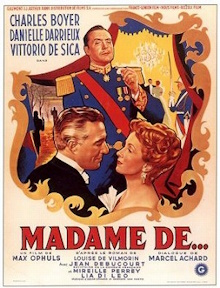This French film by German director Max Ophüls defies genres as it at times feels like a comedy and other times like a serious romantic film. It boasts superb production values with lavish sets, over-the-top period costumes and a very aristocratic atmosphere. As my wife noted, its opening title card with its music feels very much in the style of Hollywood. Yet it soon becomes clear that its conception of the proper relationship between a husband and wife and of the role of passionate style is very much in the European style. I don’t really get the humor in play here but I did enjoy its delicious subversiveness.
Louise, the pampered wife of a wealthy and powerful French general c, finds herself needing to raise some cash and agonizes over which of her luxuries to sell. She settles on a pair of diamond earrings given to her by André as a wedding gift, selling them back to the original jeweler, and pretends that she lost them at the theatre. André raises a fuss over the loss and when the matter is reported in the newspaper as a theft, the jeweler tells the truth to him. He discreetly buys the earrings back and gifts them to his mistress who he sends to Constantinople. She soon pawns them after losing money at a casino. There they are bought by an Italian diplomat Fabrizio Donati. In Paris, Donati meets Louise and repeatedly dances with her at balls. The two fall passionately in love with each other and Donati gifts her the same pair of earrings. This time, she treasures them as they are from Donati. André is tolerant at first of Louise’s flirtations but becomes concerned when her relationship with Donati appears to be serious.
As you might expect, André ends up buying the same pair of earrings again and again over the course of the film, which is worth a few chuckles. The title itself is a joke as we never get to learn Louise’s full name. Every time someone says Madame de… the rest of the name is cut off. That’s why I’m convinced that it’s trying to be a comedy to some extent. Yet it is also very earnest in portraying the passion between Louise and Donati. I don’t quite know what to make of it as it’s not that funny and the romance is faintly ridiculous yet I can’t deny that it’s unusual and highly original. The visuals are sumptuously beautiful and the characters all elegantly aristocratic. It’s a fantastic depiction of the life of the elite at the height of Belle Époque Europe including their mannerisms, social routines and absurd sense of honor.
In any normal romantic film, the person who tries to get in between the lovers would be the villain, but it’s hard to see André as such. He is shown as being discreet and patient with Louise until she becomes too obvious and open about her love for Donati. Even when André decides to put an end to their relationship once and for all, he cites a made-up justification which may be intended to save her face. On the other hand, Louise is patently superficial and materialistic. She lies to both André and Donati with deceptions that she thinks are clever but are easily seen through. My reading of it is that passionate love is all well and good, but Ophüls’ own view seems to be that it has its time and place and André’s handling of it is the correct one, including sending his own mistress away when it is time. This strikes me as a very antiromantic romance film.
Ophüls is not counted among the great directors and the reviews for this film were mixed upon release. Its reputation has gradually grown since then and in particular the technical sophistication and dynamic camerawork are notable. He is also known to be a director with feminist leanings but I’m not sure that I see it here but it does at least show things from Louise’s perspective. Personally I love how it contrasts with the films that were being made in Hollywood during the same period even if it is not particularly impressive in other respects.
